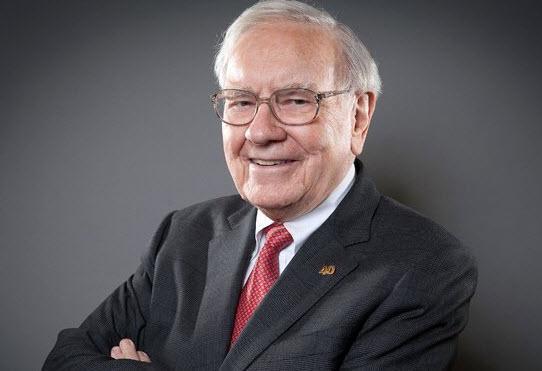How to invest like Warren Buffett?
Warren Buffett, with his company Berkshire Hathaway, has been one of the most successful investors in stocks for over 50 years. He is now known as one of the richest people on earth. Do you want to select stocks with as much success as Warren Buffett? Then read on; in this article, I will discuss his stock strategy in detail!
Who is Warren Buffett?
Warren Buffett is my personal hero: not only because of his investment strategy, but also because of his modesty.
Warren Buffett is the largest shareholder of investment company Berkshire Hathaway. If you had invested only $1,000 in this company in the 1960s, you would now own more than ten million dollars!
The great thing about Warren Buffett is that despite this enormous success, he has remained very down-to-earth and modest. His personal fortune is over 100 billion dollars. Yet, he still lives in the first house he ever bought for $31,500 in Omaha.
At the age of 11, he bought his first stock and at 13 he filed his first tax return. Since 2010, he has also been involved in the Giving Pledge, where he asks other millionaires to give half of their wealth to charity.
But what is the strategy behind this success?

Warren Buffett’s very modest house
What is Warren Buffett’s strategy?
In summary, Warren Buffett’s strategy is to buy shares in strong companies that are favorably priced. He examines the long-term value of the company compared to how the stock peforms on the market.
He uses the following selection criteria for this:
- Invest in stocks that are predictable. When the future of a company is uncertain, it is better not to invest in its stocks.
- Invest in understandable companies. Buffett prefers to invest in ice cream rather than in complex technology companies.
- Do not invest in stocks with high research or capital costs. According to Warren Buffett, the future of these companies is too uncertain.
- Buy stocks in companies that can absorb cost increases with higher profit margins. This is possible when the company can easily raise its prices.
- Warren Buffett only invests in companies with a strong and stable management.
When Warren Buffett invests, he uses fundamental analysis. Fundamental analysis looks at the numbers and growth potential behind a company. Below, we discuss the guidelines he uses within his strategy to evaluate a stock:
- The stock must have a positive earnings per share
- Earnings must have grown slowly but steadily over the past 10 years
- The long-term debt is ideally below 2X earnings and never more than 5X earnings
- The return on total assets is 12%
- The return on equity (ROE) is 15%
- The company’s free cash flow is positive
- The company should not be dependent on large capital expenditures
In the video below, you can see in detail what Warren Buffett’s strategy is. In the rest of the article, we will also delve deeper into this.
How to invest like Warren Buffett?
Buffett has several rules that he uses to determine whether to buy a stock. In this article you can find the rules that Buffett applies when considering whether to buy a stock:
Rule 1: Company Performance
Warren Buffett only invests in companies that offer a good return on equity (ROE). You calculate the return on equity by using this formula:
ROE = net income / shareholders’ equity
When selecting a stock, look at the ROE over the past 10 years. This way, you can see if a company consistently offered value to its shareholders.
Rule 2: Manageable Debt
Debt increases the risk of an investment. Interest rates fluctuate, and when interest rates rise, a highly indebted company can get into trouble. Warren Buffett only invests in companies that use a limited amount of debt. You can calculate whether a company uses a lot of debt with the debt-to-equity ratio:
Debt-to-Equity Ratio = total debt / shareholders’ equity
A high ratio means a lot of debt is being used. When investing like Warren Buffett, you should avoid these types of companies.
Rule 3: Look at Profit Margins
The profit margin shows how much of the revenue is profit. When the profit margin is high, the company is efficiently managed. You calculate the profit margin as follows:
Profit Margin = net income / net sales (profit/sales)
A high profit margin is a positive sign. When the profit margin improves, this is an indicator that the company is being managed more efficiently.
Rule 4: Low dependency on Commodities
Warren Buffett tries to avoid stocks of companies that are primarily dependent on a commodity. He also prefers not to invest in companies that produce products that are indistinguishable from those of their competitors.
He specifically looks for companies with a competitive advantage over others. This makes it possible for the company to gain a larger market share.
Rule 5: Is the company publicly tradable?
Warren Buffett almost exclusively invests in stocks that are freely tradable on the stock exchange. The companies in which he invests must have been in existence for at least 10 years.
Warren Buffett hardly ever invests in new companies. He also does not invest in companies whose business model he does not understand well.
Warren Buffett examines whether a company is fundamentally valuable, which requires sufficient data. Based on one or a few years, it is difficult to determine whether a company is worth investing in.
Rule 6: Is the stock cheap?
Finally, Warren Buffett investigates whether a stock is priced favorably. For this, he looks at the intrinsic value of the stock. This value is higher than the so-called liquidation value, which is the value of all the assets of the company.
The majority of a company’s value is intangible. Brand names like Apple and McDonald’s are worth a lot of money. However, it is difficult to assign an exact value to them. Determining whether a stock is priced favorably is therefore a challenge.
Apart from these, Warren Buffett has several specific rules. For example, he will sell his stocks when a company has negative cash flows or when high investments are required to remain active.
When a company buys back its own stocks, he sees this as a positive signal. After all, a company will only do this when it has confidence in the future. The company also clearly believes that the stocks are underpriced. And who has a better view of what is going on within the company than its own management?
What can you learn from Warren Buffett?
According to the investor himself, you do not need an exceptional IQ to be successful in investing in stocks. However, it is important to develop a solid plan of action. In this part of the article, I will discuss some stock market wisdom from Warren Buffett that you can also apply to your own investments.
Tip 1: Invest in yourself too
You will not become rich overnight with investing. You really need a good plan and mindset to achieve good results. To do this, you will need to keep learning constantly. You do this by practicing and constantly improving your results.
Would you like to practice investing yourself? You can do so with a free demo, use the button below to open one:
Tip 2: Compounding
Another important part of Buffett’s strategy is the so-called snowball effect. His quote sums it up nicely: “life is like a snowball, all you need is snow and a really long hill.” When you start with a snowflake, you end up with a snowball at the end of the ride. This is also how investments work.
Every small investment can become valueable with enough time. This is because you also receive interest on interest. When you reinvest your returns, your total investments grow exponentially. Are you curious how small monthly investments can grow? Check out this tool!
Tip 3: Diversification of Investments
Sometimes a sector can suddenly perform poorly. Warren Buffett emphasizes that it is therefore important to diversify your investments as much as possible. This allows you to offset losses in one sector or region with success in another.
If you want to achieve positive results, it is important to buy stocks in companies spread across different countries. Countries can introduce unfavorable legislation that can negatively impact companies results. The economy of one country can also collapse while the economy of another country may flourish.
The strategy is not complete yet. It is also important to spread your investments across different sectors. For example, the banking sector may perform poorly in the coming years, while the tourism sector could perform well. By diversifying across different sectors, you ensure that you are not vulnerable to problems within one type of company.
Warren Buffett therefore advises many novice investors to invest in an index fund. With an index fund, you benefit from maximum diversification. Even with smaller amounts, you can invest in different regions and sectors. Do you want to know where to invest in index funds? Use the button below to compare the best brokers:
Tip 4: Invest only in things you understand
If a company is active in a business you do not understand, it is best to avoid it. Warren Buffett advises to only invest in stocks of companies you understand. When you invest in products you do not understand well, you can lose a lot of money.
A good example of this was the complex financial bonds that yielded significant returns a few years ago. We now know that these products contained mortgages and loans that were resold multiple times and could never be repaid by the borrowers. This was even the cause of the 2008 financial crisis!
Tip 5: Avoid unnecessary costs
Another investment tip from Warren Buffett is to limit unnecessary costs, such as high interest costs on a credit card.
But when you start investing, you should also minimize costs as much as possible. When the costs on your investment account are high, you achieve a much lower return.
Tip 6: Invest for the long term
Warren Buffett is a big advocate for long-term investing. He therefore only invests in strong companies with a positive future outlook.
With this strategy, you do not have to worry about economic crises. A strong company survives an economic crisis and comes out even stronger.
Tip 7: Buy stocks at the right time
According to Warren Buffett, investors should not fear sudden drops in stock prices. A crisis is a good time to buy the shares of strong companies.
Warren Buffett often keeps a large cash position, so he can act quickly when stocks are available at a lower price.
What are Warren Buffett’s favorite stocks?
Warren Buffett’s portfolio consists of more than 45 different stocks. However, the following 4 stocks are collectively responsible for more than 70% of the value of his portfolio:
- Apple : Buffett is a big fan of Apple due to the loyalty of its users and owns more than 5% of the company.
- Bank of America: this stock is popular because of its strong management, high dividend payout, and share buybacks.
- American Express: Buffett owns nearly 20% of this stock and has had it in his portfolio for more than 30 years.
- Coca-Cola: Warren Buffett has been investing in this brand since 1980. He is a big fan of Coca-Cola and believes that its strong distribution network and brand name are significant advantages.
How to invest in Berkshire Hathaway yourself?
You can also invest in Warren Buffett’s company: Berkshire Hathaway. For an A share, you will have to pay a hefty price of over $400,000. The B shares are more attractively priced for individual investors, as you can invest in them with just a few hundred dollars. Berkshire Hathaway does not pay a dividend and is meant as a long-term investment.
Graham as Buffett’s mentor
Buffett learned many of his stock market wisdom from Graham when he worked for him at a young age. But what did he learn from Graham?
Both investors share the view that you only buy stocks when the intrinsic value of the company is higher than the market value. Therefore, they do not look for speculative stocks that can earn a huge amount in one go. Instead, they focus on finding undervalued stocks.

Buffett has learned from Graham to be very patient. It is important to thoroughly research the company you want to buy before making a move. It is even more important to only take action when there is a good reason to do so. The best investors have a high degree of patience and sometimes do nothing for years. This method of investing is also called value investing.
However, Buffett has taken Graham’s strategy even further. He almost never sells a company. Graham regularly took his profits and looked for a new company. Buffett really looks for companies that he fully trusts and then goes all in. As long as he thinks the company has a good future vision, he won’t just sell the stock.
Frequently Asked Questions About Warren Buffett
Warren Buffett started investing at the age of 11 and had his first job at the age of 13. When he became an adult, he started his own insurance company and invested his money in undervalued companies. Ultimately, he bought Berkshire Hathaway, which he used to build an investment empire.
Yes, he started his own company and also executed his own investments. However, he came from a wealthy family, which allowed him to attend Columbia University.
Warren Buffett’s best investments are Apple, Bank of America, American Express, Chevron, Coca-Cola, Kraft Heinz, Occidental Pretroleum, and Hewlett Packard.
Auteur

Over Alex Mostert
When I was 16, I secretly bought my first stock. Since that ‘proud moment’ I have been managing trading.info for over 10 years. It is my goal to educate people about financial freedom. After my studies business administration and psychology, I decided to put all my time in developing this website. Since I love to travel, I work from all over the world. Click here to read more about trading.info! Don’t hesitate to leave a comment under this article.
